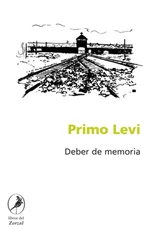In addition, there are innumerable circumstances, normally irrelevant, which here become problems. When one’s nails grow long, they have to be shortened, which can only be done with one’s teeth (for the toenails, the friction of the shoes is sufficient); if a button comes off, one has to tie it on with a piece of wire; if one goes to the latrine or the washroom, everything has to be carried along, always and everywhere, and while one washes one’s face, the bundle of clothes has to be held tightly between one’s knees: in any other manner it will be stolen in that second. If a shoe hurts, one has to go in the evening to the ceremony of the changing of the shoes: this tests the skill of the individual who, in the middle of the incredible crowd, has to be able to choose at an eye’s glance one (not a pair, one) shoe, which fits. Because once the choice is made, there can be no second change.
And do not think that shoes form a factor of secondary importance in the life of the Lager. Death begins with the shoes; for most of us, they show themselves to be instruments of torture, which after a few hours of marching cause painful sores which become fatally infected. Whoever has them is forced to walk as if he was dragging a convict’s chain (this explains the strange gait of the army which returns every evening on parade); he arrives last everywhere, and everywhere he receives blows. He cannot escape if they run after him; his feet swell and the more they swell, the more the friction with the wood and the cloth of the shoes becomes insupportable. Then only the hospital is left: but to enter the hospital with a diagnosis of ‘dicke Füsse’ (swollen feet) is extremely dangerous, because it is well known to all, and especially to the SS, that here there is no cure for that complaint
And in all this we have not yet mentioned the work, which in its turn is a Gordian knot of laws, taboos and problems.
We all work, except those who are ill (to be recognized as ill implies in itself an important equipment of knowledge and experience). Every morning we leave the camp in squads for the Buna; every evening, in squads, we return. As regards the work, we are divided into about two hundred Kommandos, each of which consists of between fifteen and one hundred and fifty men and is commanded by a Kapo. There are good and bad Kommandos; for the most part they are used as transport and the work is quite hard, especially in the winter, if for no other reason merely because it always takes place in the open. There are also skilled Kommandos (electricians, smiths, bricklayers, welders, mechanics, concrete-layers, etc.), each attached to a certain workshop or department of the Buna, and depending more directly on civilian foremen, mostly German and Polish. This naturally only applies to the hours of work; for the rest of the day the skilled workers (there are no more than three or four hundred in all) receive no different treatment from the ordinary workers. The detailing of individuals to the various Kommandos is organized by a special office of the Lager, the Arbeitsdienst, which is in continual touch with the civilian direction of the Buna. The Arbeitsdienst decides on the basis of unknown criteria, often openly on the basis of protection or corruption, so that if anyone manages to find enough to eat, he is practically certain to get a good post at Buna.
The hours of work vary with the season. All hours of light are working hours: so that from a minimum winter working day (8-12 a.m. and 12.30-4 p.m.) one rises to a maximum summer one (6.30-12 a.m. and 1-6 p.m.). Under no excuse are the Häftlinge allowed to be at work during the hours of darkness or when there is a thick fog, but they work regularly even if it rains or snows or (as occurs quite frequently) if the fierce wind of the Carpathians blows; the reason being that the darkness or fog might provide opportunities to escape.
One Sunday in every two is a regular working day; on the so-called holiday Sundays, instead of working at Buna, one works normally on the upkeep of the Lager, so that days of real rest are extremely rare.
Such will be our life. Every day, according to the established rhythm, Ausrücken and Einrücken, go out and come in; work, sleep and eat; fall ill, get better or die.
… And for how long? But the old ones laugh at this question: they recognize the new arrivals by this question. They laugh and they do not reply. For months and years, the problem of the remote future has grown pale to them and has lost all intensity in face of the far more urgent and concrete problems of the near future: how much one will eat today, if it will snow, if there will be coal to unload.
If we were logical, we would resign ourselves to the evidence that our fate is beyond knowledge, that every conjecture is arbitrary and demonstrably devoid of foundation. But men are rarely logical when their own fate is at stake; on every occasion, they prefer the extreme positions. According to our character, some of us are immediately convinced that all is lost, that one cannot live here, that the end is near and sure; others are convinced that however hard the present life may be, salvation is probable and not far off, and if we have faith and strength, we will see our houses and our dear ones again. The two classes of pessimists and optimists are not so clearly denned, however, not because there are many agnostics, but because the majority, without memory or coherence, drift between the two extremes, according to the moment and the mood of the person they happen to meet.
Here I am, then, on the bottom. One learns quickly enough to wipe out the past and the future when one is forced to. A fortnight after my arrival I already had the prescribed hunger, that chronic hunger unknown to free men, which makes one dream at night, and settles in all the limbs of one’s body. I have already learnt not to let myself be robbed, and in fact if I find a spoon lying around, a piece of string, a button which I can acquire without danger of punishment, I pocket them and consider them mine by full right. On the back of my feet I already have those numb sores that will not heal. I push wagons, I work with a shovel, I turn rotten in the rain, I shiver in the wind; already my own body is no longer mine: my belly is swollen, my limbs emaciated, my face is thick in the morning, hollow in the evening; some of us have yellow skin, others grey. When we do not meet for a few days we hardly recognize each other.
We Italians had decided to meet every Sunday evening in a corner of the Lager, but we stopped it at once, because it was too sad to count our numbers and find fewer each time, and to see each other ever more deformed and more squalid. And it was so tiring to walk those few steps and then, meeting each other, to remember and to think. It was better not to think.
After the first day of capricious transfer from hut to hut and from Kommando to Kommando, I am assigned to Block 30 late one evening, and shown a bunk in which Diena is already sleeping. Diena wakes up, and although exhausted, makes room for me and receives me hospitably.
I am not sleepy, or more accurately, my sleepiness is masked by a state of tension and anxiety of which I have not yet managed to rid myself, and so I talk and talk.
I have too many things to ask. I am hungry and when will they distribute the soup tomorrow? And will I be able to eat it without a spoon? And where will I be able to find one? And where will they send me to work? Diena knows no more than I, and replies with other questions. But from above and below, from near by and from far away, from all corners of the now dark hut, sleepy and angry voices shout at me: ‘Ruhe, Ruhe!’
I understand that they are ordering me to be quiet, but the word is new to me, and since I do not know its meaning and implications, my inquietude increases. The confusion of languages is a fundamental component of the manner of living here: one is surrounded by a perpetual Babel, in which everyone shouts orders and threats in languages never heard before, and woe betide whoever fails to grasp the meaning. No one has time here, no one has patience, no one listens to you; we latest arrivals instinctively collect in the corners, against the walls, afraid of being beaten.
Читать дальше












